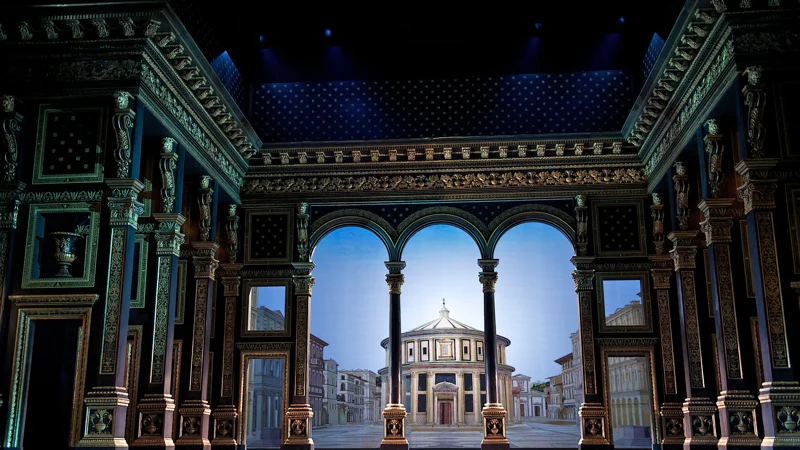Kazakh capital to premiere I Capuleti e i Montecchi Opera
The Astana Opera International Opera Academy is preparing the premiere of Vincenzo Bellini’s opera I Capuleti e i Montecchi. The story of power, duty, ambition and love that breaks through the ruins of political intrigue will be presented on June 26 at the Astana Opera’s Grand Hall, Kazinorm News Agency cites the Astana Opera's press service.

The libretto, written by Felice Romani, is based not on Shakespeare’s lines, but on Italian chronicles of the 16th century, where the Capuleti and Montecchi are not even feuding families, but rival political factions.
The production was entrusted to famous masters: the conductor is Holder of the Order of Qurmet, Maestro Ruslan Baimurzin, Honoured Worker of Kazakhstan Yevgeniy Chainikov has undertaken stage directing, Astana Opera’s principal choirmaster, Honoured Worker of Kazakhstan Yerzhan Dautov, was responsible for the work of the choir. Vocal coaches, Honoured Workers of Kazakhstan Azamat Zheltyrguzov, Zhupar Gabdullina and Giuseppe Acquaviva (Italy), are helping the academy attendees with character interpretations and fine-tuning the subtle nuances of this complex music.
Ablai Beken and Belal Kuanysh are preparing Tebaldo, Vasilisa Savkina will portray Romeo, Capellio – Shyngys Rassylkhan, whereas Sultan Bakytzhan and Adil Sultan will take the stage as Lorenzo, and Aigerim Temirbekova and Dilnaz Omarkhanova will perform Giulietta.
“This production provides incredible training for the academy attendees. Vocal skills are essential here, but the ability to live out a tragedy onstage is even more vital. Young performers learn to work in an ensemble, interact with partners, understand the characters’ inner motivations. It is important for me that they begin to think stage-wise, not just musically. I would say that this is an experience of maturing both artistically and as a human. The message of this production is that true love always goes against the interests of the powers that be. We deliberately moved away from romanticization. For us, this is story about the price of political hostility, in which feelings are doomed. Their love is like a cry inside a system that does not give the right to choose,” stage director Yevgeniy Chainikov said.
To the question, “How are the artists handling this challenge?” he answered, “With enthusiasm and dedication. I ask them to be natural, minimalistic, not just act, but live onstage. Certainly, this requires internal discipline and maturity. However, I see how they grow with each rehearsal, find intonations, meanings, details. This is, indeed, inspiring,” Yevgeniy Chainikov concluded.
Conductor Ruslan Baimurzin noted that previously only individual arias from Vincenzo Bellini’s operas were performed at Astana Opera. “This composer is a truly rare guest at Kazakh opera houses and concert halls, and the opportunity to turn to his full-scale work is all the more valuable. Bellini’s music is genuine bel canto, a style of extraordinary beauty and complexity. It requires not only technical perfection, but also great emotional commitment from the vocalists. For our soloists, this is certainly a test of sorts, but also inspiration at the same time: immersion in a new style, in a different musical world. While his creative work is included in in the repertoires of many opera houses in Europe and Americas, it is not performed very often here. And I think the more interesting it is for the audience to hear something unusual, almost unfamiliar, but at the same time so alive. Bellini is the pinnacle of singing mastery.”
Maestro Baimurzin admits that the production team thought about adapting the score to modern realities, in particular, replacing mezzo-soprano in Romeo’s part with a tenor.
“However, we deliberately abandoned this idea. It was not for nothing that Bellini chose this particular voice combination: duets of Giulietta and Romeo, soprano and mezzo-soprano, sound incredibly fresh, permeated with a special timbre interweaving. There are few such duets in the world repertoire, and we considered it of utmost importance to preserve the author’s idea. After all, theatrical performance is a live art, but it requires respect for the original source. With all our openness to new takes, we do not have the right to arbitrarily change the classics. It is important that the work of costume designers and make-up artists is impeccable – the viewers should see in front of them not a woman in a trouser role, but a full-fledged hero portrayed onstage. This practice is observed in all leading opera houses in the world, and we cannot be an exception,” Ruslan Baimurzin added.
“It is interesting that in Bellini’s orchestral canvas one can feel a kinship with Rossini and Donizetti, composers of his era. For the orchestra, the score requires a special approach to style. Here the orchestra does not simply accompany the singers, but becomes an active participant. It leads the dramatic line, conveys personalities, internal conflicts, and, ultimately, the very essence – love, which, despite hostility and prejudice, remains the centre of this musical world,” the Maestro summarized.
The premiere of I Capuleti e i Montecchi of the Astana Opera International Opera Academy will be one of the significant debuts of the Operaliya Festival.
The performance begins at 7 PM.
Noteworthy, on June 20 and 21, a new production of Tchaikovsky’s ballet The Sleeping Beauty will premiere at Astana Opera as part of the Operaliya International Music Festival.
